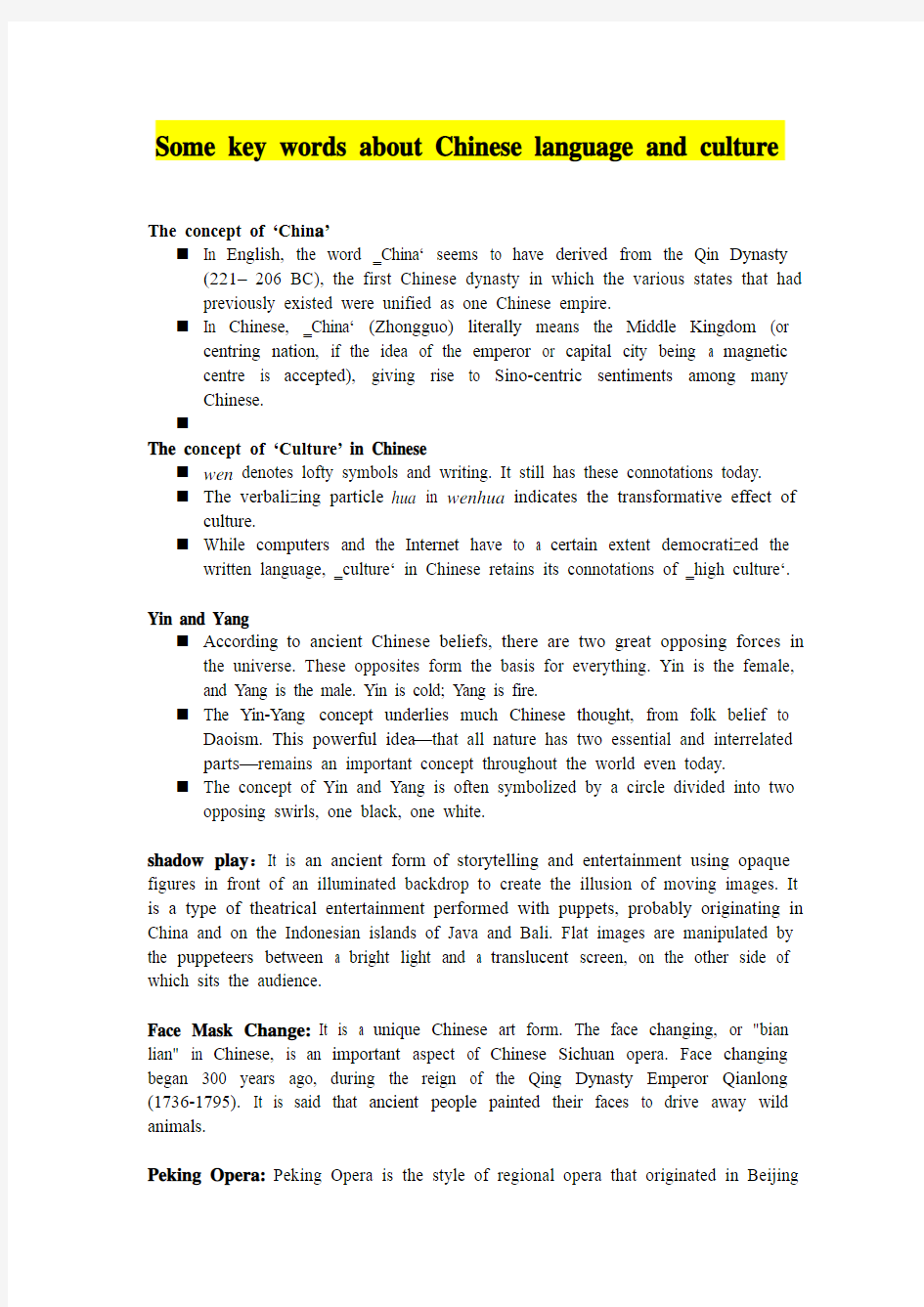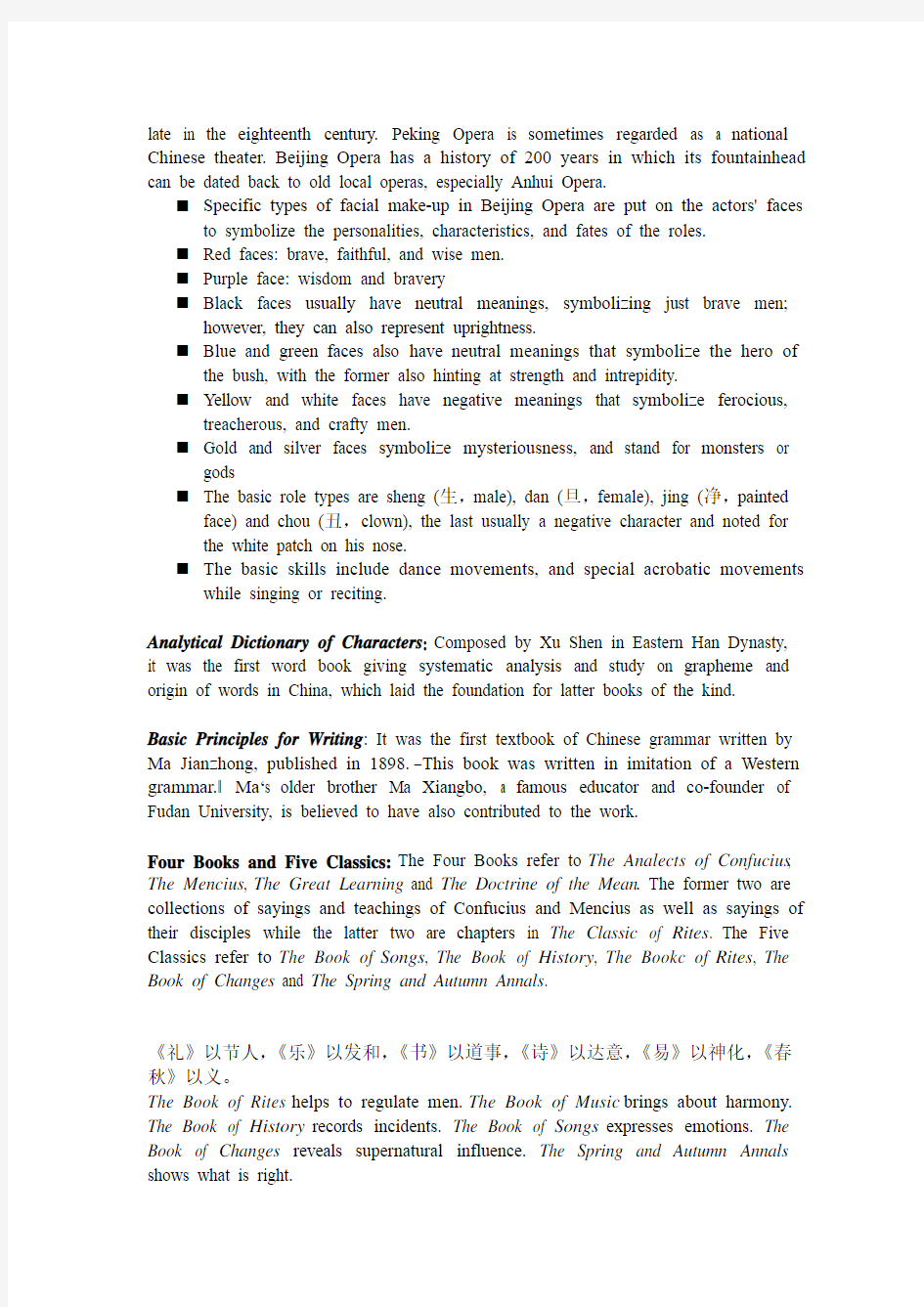some key words about Chinese language and culture


Some key words about Chinese language and culture The concept of ‘Chin a’
?In English, the word ?China‘ seems to have derived from the Qin Dynasty
(221– 206 BC), the first Chinese dynasty in which the various states that had previously existed were unified as one Chinese empire.
?In Chinese, ?China‘ (Zhongguo) literally means the Middle Kingdom (or
centring nation, if the idea of the emperor or capital city being a magnetic centre is accepted), giving rise to Sino-centric sentiments among many Chinese.
?
The c oncept of ‘Culture’ in Chinese
?wen denotes lofty symbols and writing. It still has these connotations today.
?The verbalizing particle hua in wenhua indicates the transformative effect of
culture.
?While computers and the Internet have to a certain extent democratized the
written language, ?culture‘ in Chinese retains its connotations of ?high culture‘. Yin and Yang
?According to ancient Chinese beliefs, there are two great opposing forces in
the universe. These opposites form the basis for everything. Yin is the female, and Yang is the male. Yin is cold; Yang is fire.
?The Yin-Yang concept underlies much Chinese thought, from folk belief to
Daoism. This powerful idea—that all nature has two essential and interrelated parts—remains an important concept throughout the world even today.
?The concept of Yin and Yang is often symbolized by a circle divided into two
opposing swirls, one black, one white.
shadow play:It is an ancient form of storytelling and entertainment using opaque figures in front of an illuminated backdrop to create the illusion of moving images. It is a type of theatrical entertainment performed with puppets, probably originating in China and on the Indonesian islands of Java and Bali. Flat images are manipulated by the puppeteers between a bright light and a translucent screen, on the other side of which sits the audience.
Face Mask Change:It is a unique Chinese art form. The face changing, or "bian lian" in Chinese, is an important aspect of Chinese Sichuan opera. Face changing began 300 years ago, during the reign of the Qing Dynasty Emperor Qianlong (1736-1795). It is said that ancient people painted their faces to drive away wild animals.
Peking Opera: Peking Opera is the style of regional opera that originated in Beijing
late in the eighteenth century. Peking Opera is sometimes regarded as a national Chinese theater. Beijing Opera has a history of 200 years in which its fountainhead can be dated back to old local operas, especially Anhui Opera.
?Specific types of facial make-up in Beijing Opera are put on the actors' faces
to symbolize the personalities, characteristics, and fates of the roles.
?Red faces: brave, faithful, and wise men.
?Purple face: wisdom and bravery
?Black faces usually have neutral meanings, symbolizing just brave men;
however, they can also represent uprightness.
?Blue and green faces also have neutral meanings that symbolize the hero of
the bush, with the former also hinting at strength and intrepidity.
?Yellow and white faces have negative meanings that symbolize ferocious,
treacherous, and crafty men.
?Gold and silver faces symbolize mysteriousness, and stand for monsters or
gods
?The basic role types are sheng (生,male), dan (旦,female), jing (净,painted
face) and chou (丑,clown), the last usually a negative character and noted for the white patch on his nose.
?The basic skills include dance movements, and special acrobatic movements
while singing or reciting.
Analytical Dictionary of Characters: Composed by Xu Shen in Eastern Han Dynasty, it was the first word book giving systematic analysis and study on grapheme and origin of words in China, which laid the foundation for latter books of the kind.
Basic Principles for Writing: It was the first textbook of Chinese grammar written by Ma Jianzhong, published in 1898. ―This book was written in imitation of a Western grammar.‖Ma‘s older brother Ma Xiangbo, a famous educator and co-founder of Fudan University, is believed to have also contributed to the work.
Four Books and Five Classics: The Four Books refer to The Analects of Confucius, The Mencius, The Great Learning and The Doctrine of the Mean. The former two are collections of sayings and teachings of Confucius and Mencius as well as sayings of their disciples while the latter two are chapters in The Classic of Rites. The Five Classics refer to The Book of Songs, The Book of History, The Bookc of Rites, The Book of Changes and The Spring and Autumn Annals.
《礼》以节人,《乐》以发和,《书》以道事,《诗》以达意,《易》以神化,《春秋》以义。
The Book of Rites helps to regulate men. The Book of Music brings about harmony. The Book of History records incidents. The Book of Songs expresses emotions. The Book of Changes reveals supernatural influence. The Spring and Autumn Annals shows what is right.
大学之道,在明明德,在亲民,在止于至善。知止而后有定;定而后能静;静而后能安;安而后能虑;虑而后能得。
What the Great Learning teaches, is – to illustrate illustrious virtue; to renovate the people; and to rest in the highest excellence. The point where to rest being known, the object of pursuit is then determined; and, that being determined, a calm unperturbedness may be attained to. To that calmness there will succeed a tranquil repose. In that repose there may be careful deliberation, and that deliberation will be followed by the attainment of the desired end.
The thought of Confucius
?hope for humanity;
?traditional Zhou ritual forms and written classics could serve as a sort of
blueprint for rebuilding the lost Golden Age;
?transmitting cultural forms to his contemporaries and striving to embody them
in his own person, hoping to lead his fallen world back to the dao, ―Way,‖ of Heaven.
The thought of Laozi
?The dao is the source, sustenance, and ideal state of all things in the world.
?It is ―hidden‖ and it co ntains within it the patterns of all that we see, but it is
not ontologically transcendent.
?It is the ―root‖ of all things.
The thought of Zhuangzi
?What can be known or said of the Dao is not the Dao. It has neither initial
beginning nor final end, nor limitations or demarcations.
?Life is the ongoing transformation of the Dao, in which there is no better or
worse, no good or evil.
? A truly virtuous man is free from the bondage of circumstance, personal
attachments, tradition, and the need to reform his world.
The thought of Mengzi
?amplification of the teachings of Confucius;
?―The people are the most important element in a nation; the spirits of the land
and grain come next; the sovereign counts for the least.‖ making the original goodness of human nature (xing) the keynote to his system;
Four beginnings/principles
?恻隐之心,仁之端也;
?The feeling of commiseration is the principle of benevolence.
?羞恶之心,义之端也;
?The feeling of shame and dislike is the principle of righteousness.
?辞让之心,礼之端也;
?The feeling of modesty and complaisance is the principle of propriety.
?是非之心,智之端也。
?The feeling of approving and disapproving is the principle of knowledge.
?人之有是四端也,犹其有四体也。
?Men have these four principles just as they have their four limbs.
‘clerical script’:A style of Chinese calligraphy, dating from the early Han dynasty (206 bce to 25 ce), which developed from the small-seal script. An angular and formal style, it has been used ever since for inscriptions and serious writing. The clerical script (lishu) later gave rise to three basic types which continue to be used today. They are, respectively, the standard script (kaishu), the running script (xingshu) and the cursive script (caoshu), all in use since about the fourth century ce.
孔子谓老聃曰:“丘治《诗》、《书》、《礼》、《乐》、《易》、《春秋》六经,自以为久矣,孰知其故矣,以奸者七十二君,论先王之道而明周、召之迹,一君无所钩用。甚矣夫!人之难说也,道之难明邪!”
?Confucius said to Laozi, ―I‘ve been compiling the six classics---The Book of
Poetry, The Book of History, The book of Rites, The Book of Music, The Book of Changes and Spring and Autumn Annals---for what I‘d call a long period of time. I believe that I am well acquainted with them. However, when I tried to persuade the seventy-two princes by discussing the ways of government by former kings and expounding the accomplishments by Duke of Zhou and Duke of Shao, none of them adopted my suggestions. How difficult it is! Is it difficult to convince men, or is it difficult to expound Tao.‖
Sima Qian (b. c. 145 BC, d. c. 87 BC), astronomer, calendar expert, and the first great Chinese historian. He is most noted for his authorship of the Shiji (―Historical Records‖), which is considered to be the China‘s first universal history.
?Shiji is a masterpiece that took 13(?) years to produce, it deals with major
events and person alities of about 2,000 years (down to the author‘s time), comprising some 130 chapters and totaling more than 520,000 words.
?The Shiji was not only the first general history of its kind attempted in China,
it also set a pattern in organization for dynastic histories of subsequent ages.
?An artist as well as a historian, Shima Qian succeeded in making events and
personalities of the past into living realities for his readers; his biographies subsequently became models for authors of both fiction and history.
?礼尚往来。
?Courtesy demands reciprocity.
?What the rules of propriety value is that reciprocity.
?知耻近乎勇。
?Having a sense of shame is close to being courageous.
?
?夫礼者,自卑而尊人。
?Propriety is seen in humbling one's self and giving honor to others.
?人之患在好为人师。
?The evil of men is that they like to be teachers of others.
?君子欲讷於言,而敏於行。(《论语》)
?The superior person wishes to be slow in speech and earnest in conduct.
?道可道,非常道;名可名,非常名。
?The Tao that may be called Tao is not the invariable Tao. The names that can
be named are not invariable names.
?Truths may be told, but not eternal Truth. Names may be names, but not
eternal names.
?学而不思则罔,思而不学则殆。
?Learning without thought is labor lost; thought without learning is perilous.
?知者不惑,仁者不忧,勇者不惧。
?The wise are free from perplexity, the kind free from anxiety, and the bold free
from fear.
?诚者,物之终始。不诚无物。
?Sincerity is the beginning and end of all things. Without sincerity there is
nothing.
?乐天命复奚疑
